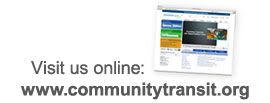Thursday, February 21, 2013
State Senate Considers Transit Bill
The Washington Senate Transportation Committee yesterday heard testimony on SB 5773 which would authorize a local motor vehicle excise tax (MVET) to support Community Transit service, if approved by voters. The bill was introduced by Sen. Nick Harper of Everett.
Those testifying in favor of the bill included Joe Marine, Mayor of Mukilteo and chair of the Community Transit Board of Directors, Community Transit CEO Joyce Eleanor, and representatives from United Way, Economic Alliance Snohomish County, Workforce Development Council, Boeing Machinists Union (IAM), UW and Transportation Choices Coalition.
The bill allows Community Transit to seek up to one percent MVET on car registrations within the service district, which is most of Snohomish County excluding Everett. CEO Joyce Eleanor says such funding could be used to bring back Sunday and late-night bus service, and that any specific service plan would go through a public process with input from riders.
In opposition to the bill, Michael Ennis of the Association of Washington Businesses said the AWB wanted the MVET funding source to remain part of a statewide transportation package, and not “peeled off” to benefit one agency.
SB 5773 is the first of several proposals that could fund Community Transit service. A companion “local option” bill has been introduced in the House, while a separate statewide “roads and transit” transportation funding package was announced yesterday by House Transportation Committee Chair Judy Clibborn.
Subscribe to:
Post Comments (Atom)






Is there any proposal which would not require a public vote to get funds? I don't think the majority of voters would approve a new tax on themselves, only a small percent of the voters take the bus anyway. I take a commuter bus daily and probably would not vote to increase my taxes. Returning late nights and sunday bus is just not important to me.
ReplyDeleteAt this time, the proposals that could fund Community Transit require a public vote. Keep in mind that the state legislature is working under a provision that it cannot pass any measure that raises taxes unless there is a two-thirds majority to support it. In that climate, it is likely that such "local options" bill will require a public vote, because that legislation only needs a simple majority to pass.
ReplyDelete